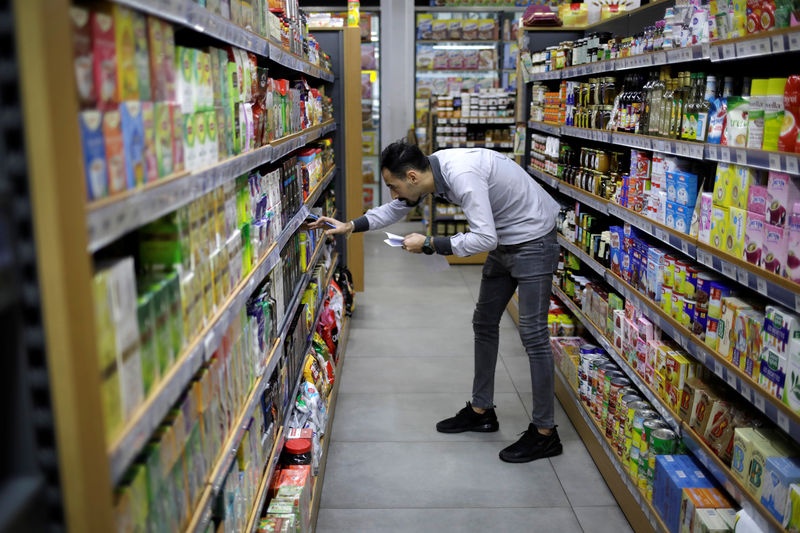By Tom Arnold and Lisa Barrington
BEIRUT (Reuters) - Lebanese traders are struggling to pay for imports of everything from pasta to nappies as banks impose restrictions on lines of credit in response to concerns about tighter liquidity after weeks of street demonstrations.
Huge anti-government protests have led to the resignation of Prime Minister Saad al-Hariri and heaped pressure on an economy facing its sternest test since the 1975-90 civil war.
Importers received notices from several banks in recent days that unused credit lines were being temporarily suspended.
The notices, seen by Reuters, caused a huge headache for importers who rely on such facilities to pay for goods from overseas.
"It's disastrous," said Hani Bohsali, general manager of Bohsali Foods. "We have shipments to bring and suddenly we're not able to transfer to suppliers.
"Yesterday I had a payment due for one company in Egypt of $35,000 and tomorrow I have another due for a company in Thailand. Everything is frozen until further notice."
Bohsali, president of the Syndicate of Importers of Foodstuffs, Consumer Products and Drinks, which represents around 50 importers, imports several hundred thousand dollars of goods a week, ranging from pasta to cocoa powder.
The central bank has not imposed formal capital controls on banks, which re-opened on Friday after being closed for two weeks due to the demonstrations.
But with a scramble for U.S. dollars straining the fixed exchange rate, banks have introduced temporary controls to prevent capital flight.
CREDIT RESTRICTIONS
Importers have so far not reported shortages of goods and are not concerned about that risk in the coming days as they expect the credit restrictions to be temporary.
But the restrictions are putting more strain on an economy already struggling with zero growth and slowing capital inflows when the protests erupted on Oct. 17.
Since then, some companies have paid their staff half salaries for October while other firms will do the same in November, employees said.
Some banks have also restricted the amount of money customers can withdraw from U.S. dollar accounts to a few thousand dollars a week.
"When the banks reopened we were told by the banks you're not able to use the balance of the old credit facilities we use to pay suppliers," said Shadi Hussein, regional business development manager at Obegi Consumer Products, one of Lebanon's biggest food companies.
"Fortunately, we have a good relationship with our suppliers so they understand the situation for a period of time but for smaller companies it's very difficult," said Hussein, who imports biscuits, canned food and other consumer goods.
Banks are reviewing the situation hourly in coordination with the central bank and adjusting their position accordingly, said Salim Sfeir, chairman of the Association of Banks in Lebanon.
"The country is going through a political upheaval and we are trying to avoid turning it into a financial crisis," he said in written response to questions from Reuters.
"Our main task is to provide vital needs to the country. Because of the two weeks of closure due to security concerns, we had requests piling up. We don't have a policy of restrictions but we are prioritizing."
IMPORT-RELIANT
With only a tiny industrial and manufacturing sector and few natural resources, the Lebanese economy relies on imports. Lebanon's imports hit $10.1 billion in the first half of 2019, 6% up from the same period of last year, while its trade deficit, the measure by which imports exceed exports, widened to $8.4 billion.
Hussein said the restrictions were a further headache for companies already reeling because the closure of the banks prevented sales staff from collecting payment from customers.
A slowdown in cash remittances from Lebanese abroad has put pressure on the central bank’s foreign currency reserves in recent years.
Before the protests erupted and as dollar scarcity created a parallel market for the Lebanese pound, the central bank said it would prioritize dollars for fuel, medicine and wheat.
Not all payments for goods are disrupted. Some traders who do not use lines of credit are able to transfer funds to suppliers directly.
Paul Mansour, who owns a flour mill, said he made four payments to suppliers by putting cash in the bank himself to make the transfers.
